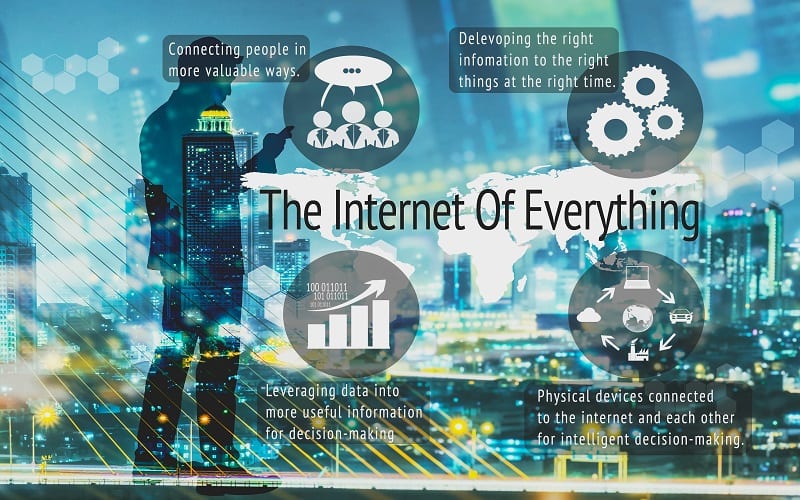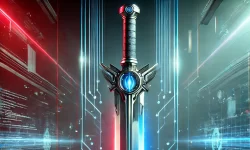As the internet evolves, what will be the impact of the convergence of the current IoT infrastructure with blockchain and artificial intelligence?
Introduction
The internet is evolving beyond its technical infrastructure. As we move towards creating integrated cyberspace, aquaspace, geospace and space (CAGS) internet of everything (IoE) ecosystem that benefits from the fast-tracking technology, application trend paradigm shifts, and convergence beyond blockchain and artificial intelligence, it raises more questions than answers.
The reason behind that is the existing and emerging technologies that have created the Internet of things (IoT) are not changing just the internet, but they are instead altering the very things connected to the internet: the devices, sensors, and gateways on the edge of the distributed network that can request a service or start an action without human intervention.
As a result, the evolution of the internet is happening at many levels considering artificial intelligence (AI) can now take the petabytes of data they have from a distributed network and extract meaningful information from it. Moreover, blockchains and other distributed technologies are enabling automated and intelligent man-to-machine (M2M) networks that could shape the intelligent systems at all levels for nations: its government, industries, organizations, and academia (NGIOA). As a result, IoTs are on their way to not only fundamentally defining, designing, and developing intelligent systems at all levels by making them connected, smart, efficient, and affordable but are also changing the very foundation and fabric of the internet.
From centralized to decentralized systems, public to private, automated to the autonomous, intranet to the internet— when each new evolving application and system brings with it a different technology and security infrastructure – it brings with it new risks and rewards. As a result, it is creating complex challenges for not only securing the IoT ecosystem but also for performing everyday tasks such as sensing, processing, storing information, communicating, analyzing, and taking timely action for which, no nation seems to be prepared.
That brings us to an important question: Would the emerging convergence of the current IoT infrastructure with blockchain and artificial intelligence bring much-needed security to the changing internet?
Acknowledging this emerging reality, Risk Group initiated a much-needed discussion on “The Convergence of Blockchain and the Internet of things (IoT)” with Dr. John Cohn, an IBM Fellow at the IBM Watson, Internet of Things Division, on Risk Roundup.
Disclosure: I am the CEO of Risk Group LLC.
Dr. John Cohn, an IBM Fellow at the IBM Watson, Internet of Things Division, participates in Risk Roundup to discuss “The Convergence of Blockchain and Internet of Things (IoT).”
The Emerging IoT Ecosystem
In the coming years, from the internet of things to the internet of nano things (IoNT) and the internet of everything (IoE), there will be billions of connections across CAGS. When physical objects in geospace, aquaspace, and space become embedded with sensors and gain the ability to communicate across cyberspace, newly emerging information and communication networks will fundamentally change the CAGS paradigm.
The very concept of the IoE is that machines, objects, sensors, humans, and more can be provided with unique identifiers and the ability to transfer data over a centralized to a decentralized network. This transference would occur with or without human-to-human or human-to-computer interaction, requiring not only new technological and non-technological capabilities but also the convergence of blockchain and AI/ML.
As the IoE ecosystem takes shape amid the absence of global standards, it will be interesting to see what is possible with the evolving technological infrastructure across nations.
Static Sensors to Autonomous Machines
The connection of static sensors and intelligent machines brings together the IoT. While static sensors can measure, and gather data, the real value that the IoT brings is perhaps at the intersection of gathering data, communicating the information, and extracting intelligence in real-time for timely action. The data collected by the sensors from across CAGS is not worth very much if there isn’t an intelligence infrastructure in place to analyze and respond to the data in real-time.
As a result, the IoT ecosystem is evolving rapidly. The technologies that allow for data collection, remote monitoring, and control of devices are on their way to becoming a network of autonomous machines that can interact with each other and with their environment and make smart decisions with or without human intervention. This will fundamentally change the very fabric and foundation of the internet.
Towards Blockchain-IoT-AI Convergence Model
Since the architecture of the current IoT ecosystem is based on a centralized model known as the server/client model where all devices are identified, authenticated, and connected through cloud servers that support colossal processing and storage capacities, it seems that the servers/server farms can be costly and also make IoT networks vulnerable to cyber-attacks. As the applications emerge for sensitive tasks and critical infrastructure, this can impact the evolving IoT ecosystems themselves. That brings us to a vital analysis point: does decentralization need to be a part of the IoT equation?
The internet of things, or devices that talk to each other are by nature, distributed. As a result, it’s only reasonable that the decentralized, distributed ledger technology like blockchain plays a vital role in how devices will communicate directly with each other, or with human decision-makers. Now, since all IoT devices will need to be tagged, how the trail of IoT devices and what they interact with will also need to be documented as it will undoubtedly play a definitive role beyond the internet. Understandably, the security paradigm is shifting.
Now blockchain technology will likely enable the creation of secure mesh networks, where IoT devices will be able to interconnect reliably while avoiding cyber threats. With every authentic node being registered and recorded on the blockchain, IoT devices on the network will be able to identify and authenticate each other without the need for human authorization or authority. As a result, the authentication network will be scalable to support billions of devices without the need for additional human resources.
Leveraging blockchain for IoT data offers new ways to automate processes at all levels without setting up a complicated and expensive centralized authentication and storage technology infrastructure. This is believed to be a key solution for networks in which growing computing power exists at the edge: in sensors, appliances, and other distributed devices. That brings us an important question: is blockchain technology the missing link to settle security, privacy, and reliability concerns of the evolving internet of things ecosystem?
Because the generation, storage, analysis, and communication of data, information, and intelligence are fundamental to the IoT ecosystem, there is a need for protecting data throughout its life cycle. The question then is: how will data security be addressed? Do we have an effective technology solution?
What Next?
Internet of things, blockchain, and artificial intelligence are some of the leading drivers of the changing internet ecosystem. While the internet of things convergence to blockchain and artificial intelligence has a great promise and is changing the very fabric of the internet infrastructure, protocols, and processes, the changing geopolitics, and complex security challenges must be identified, understood, and tackled before these converging systems get widely adopted.
NEVER MISS ANY OF DR. PANDYA’S POSTS
Join here for a regular update.





 A New Operating System For Humanity
A New Operating System For Humanity